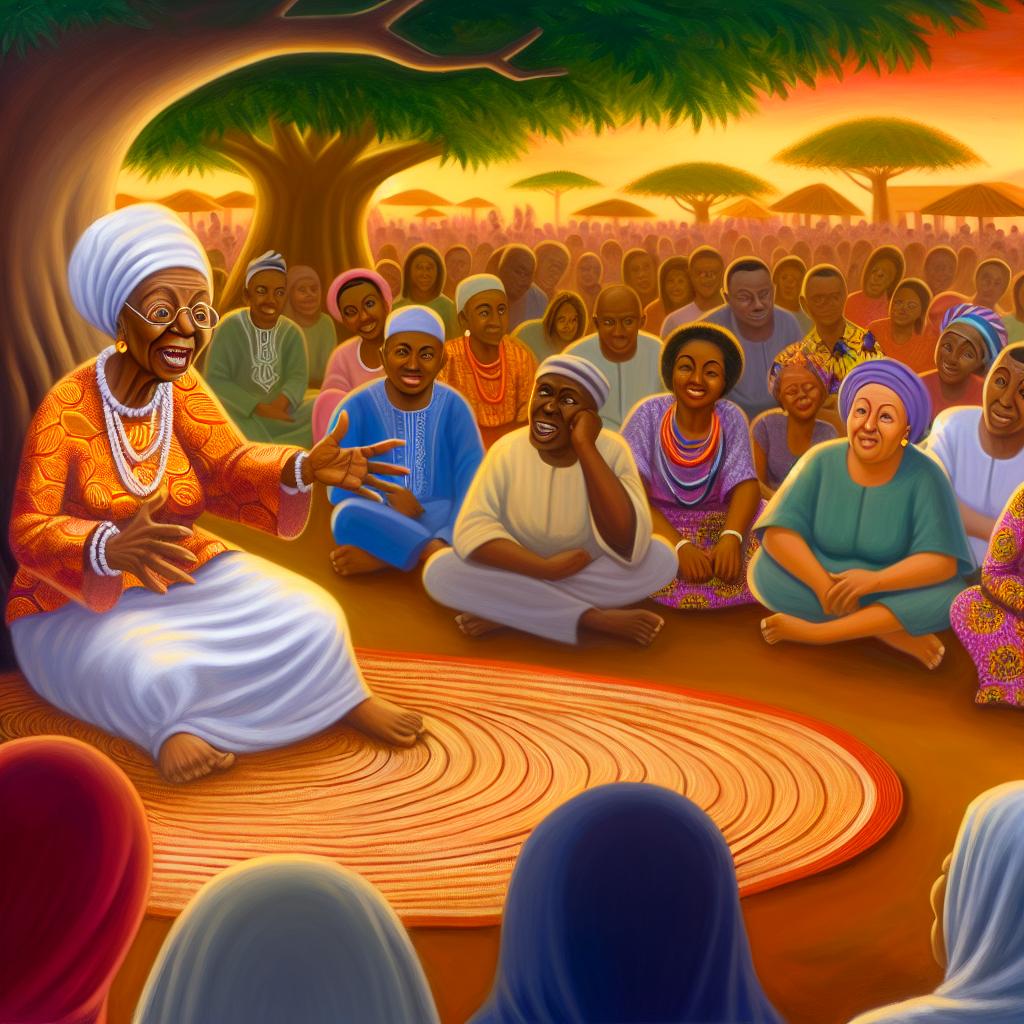Overview of Nigerian Proverbs and Their Cultural Significance
Importance of Proverbs in Nigerian Society
Nigerian proverbs carry deep meanings passed down through generations.
They reflect communal wisdom and life experiences.
Moreover, they serve as moral guides for behavior and decision-making.
Proverbs also strengthen cultural identity among diverse ethnic groups.
For example, the Yoruba, Igbo, and Hausa peoples use proverbs uniquely.
These expressions help preserve oral traditions and shared values.
Role of Proverbs in Shaping Marriage Values
Marriage remains a crucial institution in Nigerian culture.
Proverbs influence how individuals approach relationship commitments.
They emphasize virtues like patience, respect, and mutual support.
Additionally, proverbs highlight the collective role of family and community.
This communal involvement ensures marriages sustain beyond personal interests.
Common Themes Found in Nigerian Marriage Proverbs
Many proverbs focus on the unity and harmony between spouses.
Others stress the importance of effective communication and understanding.
Some highlight the value of perseverance through challenges.
Trust and loyalty consistently appear as foundational elements.
Proverbs also encourage compromise and conflict resolution skills.
Transmission and Usage of Proverbs
Elders typically teach proverbs to younger generations during gatherings.
Parents use them to advise children about marital responsibilities.
Community ceremonies often feature proverbs to reinforce shared values.
Storytellers incorporate proverbs to engage listeners and impart lessons.
Overall, proverbs remain a vital tool in maintaining social cohesion.
Role of Proverbs in Shaping Traditional Marriage Values in Nigeria
Proverbs as Cultural Guides
Nigerian proverbs serve as essential cultural guides in everyday life.
They convey wisdom passed down through generations.
Consequently, proverbs influence how people understand marriage.
They teach respect, commitment, and the importance of family bonds.
For instance, the Igbo proverb “He who marries a good wife marries peace” highlights marital harmony.
Similarly, Yoruba sayings stress mutual support and understanding between spouses.
Therefore, proverbs shape attitudes toward marriage roles and expectations.
Teaching Values Through Storytelling
Storytelling integrates proverbs to teach marriage values to young people.
Parents and elders share these stories during family gatherings.
This tradition reinforces the importance of loyalty and patience in marriage.
Moreover, it helps prepare couples for challenges within their union.
For example, Hausa proverbs emphasize patience as a key to marital success.
Thus, storytelling fosters a deep connection to cultural ideals.
Encouraging Communication and Conflict Resolution
Proverbs promote open communication between spouses.
They often advise calmness and understanding during disagreements.
For example, the Nupe saying “A calm river does not lose its course” encourages peaceful dialogue.
In addition, these sayings guide couples to resolve conflicts respectfully.
Consequently, proverbs help maintain lasting marital harmony.
Emphasis on Family and Community
Nigerian proverbs emphasize the role of family in marriage.
They remind couples of their duties beyond the household.
For instance, the Tiv proverb teaches that marriage strengthens community ties.
Furthermore, proverbs encourage respect for elders and in-laws.
This collective focus sustains social cohesion and support.
Continuing Influence of Proverbs in Modern Nigerian Society
Despite modernization, proverbs continue to influence marriage values.
Young couples still seek advice from elders rooted in these sayings.
Marriage counselors incorporate proverbs to address relational issues.
Thus, traditional wisdom remains vital in contemporary relationships.
Examples of Popular Nigerian Proverbs Related to Marriage
Wisdom from Yoruba Proverbs
Yoruba proverbs offer deep insight into marriage values.
For example, “Ibi ti a ti mọwo la fi ńsan owo” means debts are paid where they arise.
This proverb encourages couples to address challenges where they originate promptly.
Additionally, “Ìjòkòó ní ń mú kí ọkọ àti aya nífẹ́ ara wọn” shows sitting together builds love.
It emphasizes the importance of spending quality time to strengthen marital bonds.
Marriage Lessons from Igbo Proverbs
Igbo proverbs also provide valuable lessons for married life.
One popular saying is “Nwunye na-eto nwa ya mbọ, ọ na-eto nna ya atọrọ ya.”
This means a wife who cares for her child also honors her husband.
Thus, the proverb highlights mutual respect and joint responsibility in families.
Similarly, “Ewu nʼachọ mma, ma nọ bụrị ụbọ” advises patience and understanding.
This encourages spouses to tolerate flaws and work with each other patiently.
Marriage Insights from Hausa Proverbs
Hausa proverbs reveal cultural values related to marriage.
The saying “Komai nisan jifa ƙasa zai ruwa” means all arrows eventually reach the ground.
It advises couples to stay committed despite hardships in marriage.
Another proverb says “Gida mai gadi, shi ke da mai hakuri,” stressing endurance.
This stresses that a household thrives with patience and perseverance.
Common Themes Across Nigerian Proverbs
Many proverbs emphasize respect as the foundation of marriage.
Get Your Wedding Business Featured on MarriageInNigeria.ng
Build trust, show up on Google, and attract more clients with a done-for-you profile post.
Get Featured NowFor example, mutual trust fosters peace and love between spouses.
Additionally, patience appears as a vital trait to maintain harmony.
Effective communication is often implied as a key to lasting relationships.
Furthermore, shared responsibility strengthens family unity.
Proverbs That Inspire Practical Marriage Values
These proverbs encourage couples to support each other genuinely.
They remind spouses to nurture love through actions and words daily.
Moreover, they highlight the importance of forgiveness in resolving conflicts.
Respect for elders and community also plays a role in sustaining marriages.
Ultimately, Nigerian proverbs provide timeless wisdom to guide married life.
See Related Content: Marriage as a Symbol of Unity in Nigerian Society
How Proverbs Emphasize the Importance of Mutual Respect Between Spouses
Mutual Respect as a Foundation for Marriage
Nigerian proverbs highlight respect as central to marital harmony.
They teach that respect between spouses fosters trust and understanding.
In many cultures across Nigeria, respect is viewed as a mutual responsibility.
Therefore, couples who show respect enjoy stronger and longer-lasting unions.
Respect creates a peaceful environment where love can thrive effectively.
Examples of Proverbs Illustrating Mutual Respect
One Yoruba proverb states, “Eni to ba fọ́rẹ̀n aya rẹ̀, ó ní jẹ́ kọ́ ní ìyàtọ̀.”
This means a husband who loves his wife allows her dignity and space.
Another Igbo proverb says, “Nwunye ọ́ma bụ ezigbo akụnụba.”
This translates to a good wife is true wealth, encouraging regard for her value.
Furthermore, the Hausa expression “Komai nisan jifa ƙasa zai sauka” reminds couples that actions affect their relationship equally.
These proverbs guide couples to honor and elevate each other in marriage.
Practical Lessons from Proverbs on Respect
Proverbs encourage couples to listen actively and appreciate each other’s opinions.
They advise avoiding harsh words that may damage the marital bond.
Additionally, sharing household duties promotes equality and respect.
Showing gratitude daily reinforces the respect woven into marriage.
Finally, elders use proverbs to teach younger families the value of patience and empathy.
The Role of Community in Reinforcing Mutual Respect
Nigerian societies often use proverbs to counsel couples during conflicts.
Community elders remind couples that respect sustains their family’s reputation.
Social gatherings present opportunities to share wise sayings about marital respect.
This collective wisdom strengthens societal support for healthy marriages.
Consequently, couples internalize respect as a virtue fundamental to love.
Delve into the Subject: Marriage as a Rite of Passage in Nigerian Communities
Influence of Proverbs on Conflict Resolution Within Nigerian Marriages
Role of Proverbs in Promoting Understanding
Nigerian proverbs often teach patience and empathy in marital relationships.
For example, the Igbo saying, “Nwata bulie aka nke ya, aka nna ya akporo ya,” means children learn by example.
This proverb encourages couples to model respectful behavior during disagreements.
Consequently, partners develop deeper understanding and avoid escalating conflicts.
Similarly, Yoruba proverbs emphasize calmness, such as “Iro ti o npa lowo, ko pa enu re,” which warns against hurting one’s own voice with lies.
These expressions foster honest communication, critical for resolving disputes.
Encouragement of Forgiveness and Reconciliation
Many proverbs underscore the importance of forgiveness in sustaining marriage.
The Hausa saying, “Ku yabo zuciya ta zama kamar ruwan sanyi,” advises cooling one’s anger quickly.
This proverb promotes swift forgiveness to restore harmony between spouses.
Moreover, proverbs like “Se nkan ti o nirora, ko ni itumo lai bori,” teach that challenges should be overcome together.
Therefore, couples learn to face conflicts as a team rather than opponents.
Guidance on Effective Communication
Proverbs serve as tools to remind couples to communicate carefully and respectfully.
The Tiv adage, “Ikyer a ga a lu nyia, kpa ior a ga a,” means words can heal or hurt deeply.
This highlights the power of speech in either resolving or worsening conflicts.
Thus, couples are encouraged to speak thoughtfully during disagreements.
Additionally, the Efik proverb, “Anwa ima enye obio,” reminds partners to speak only what benefits the community.
In marriage, the community can be interpreted as the family unit.
Collective Wisdom in Handling Marital Disputes
Nigerian proverbs encapsulate collective wisdom passed down through generations.
They offer practical advice on managing disputes without external intervention.
For instance, the Igala saying, “Onu eri, onu ogwu,” means words can be medicine or poison.
Thus, couples use proverbs to mediate conflict before escalation.
Community elders often invoke these proverbs during counseling sessions.
Hence, the cultural context strengthens marital bonds through shared values.
Common Proverbs Used in Conflict Mediation
- “Agba ti ko mo eke, omo re a ko eke.” (The elder who does not learn, his children will also not learn.)
- “Oro ki i pa, enu ki i re.” (Words do not kill; the mouth never tires.)
- “Ijo ba maa dana ku, ko ma je lati ojujo.” (If the dance is to end suddenly, it should not last too long.)
- “Da lori owuro ti a se, aye o jina si iwo ti a se.” (Based on the morning’s work, the day’s journey will not be too far.)
These proverbs help couples refocus on their commitment and mutual respect.
Explore Further: The Changing Face of Marriage in Nigeria: Trends and Insights
Connection Between Proverbs and Expectations of Gender Roles in Marriage
Role of Proverbs in Shaping Social Norms
Nigerian proverbs reflect deep cultural values about marriage and family life.
They often convey expectations about appropriate behavior for husbands and wives.
For example, proverbs guide how spouses should interact and fulfill their roles.
Consequently, these sayings influence societal attitudes toward gender roles.
Therefore, many couples internalize these values during marriage.
Expectations of Men in Marriage
Proverbs commonly portray men as providers and protectors of the family.
They emphasize a husband’s responsibility to ensure financial stability.
For instance, a saying like “The man is the head of the household” is widespread.
Get Your Wedding Business Featured on MarriageInNigeria.ng
Build trust, show up on Google, and attract more clients with a done-for-you profile post.
Get Featured NowMoreover, men are expected to lead family decisions and maintain order.
Thus, proverbs reinforce traditional masculine roles within marriage.
Expectations of Women in Marriage
Women are often depicted as caretakers and nurturers in marriage proverbs.
These sayings stress the importance of domestic duties and child-rearing.
For example, one well-known proverb implies that “A woman’s place is in the home.”
Furthermore, women are expected to support their husbands and promote family harmony.
Hence, proverbs sustain traditional feminine roles in many Nigerian communities.
Impact on Marital Dynamics
Proverbs directly influence how couples negotiate roles and responsibilities.
They provide a cultural script that spouses often follow.
As a result, they shape expectations about decision-making and authority.
At the same time, proverbs can limit flexibility in gender roles.
Nevertheless, they reinforce shared values that bind families together.
Contemporary Perspectives and Changing Roles
Some modern Nigerian couples reinterpret proverbs to reflect equality.
They emphasize partnership rather than rigid roles in marriage.
Additionally, education and urbanization influence evolving gender expectations.
Yet, traditional proverbs still hold significant cultural power.
Therefore, balancing heritage with progress remains an ongoing challenge.
See Related Content: How Nigerian Marriages Have Evolved: Traditions to Modern Day

Impact of Proverbs on Family Unity and Extended Family Relationships
Role of Proverbs in Strengthening Family Bonds
Nigerian proverbs teach respect and love among family members.
They emphasize the importance of mutual understanding in marriages.
Therefore, couples often use these sayings to guide their interactions.
Proverbs like “It takes a whole village to raise a child” highlight collective responsibility.
Consequently, they encourage spouses to support each other actively.
Additionally, these proverbs foster patience and forgiveness within the family.
In this way, proverbs become tools to resolve conflicts peacefully.
Families citing such wisdom maintain harmony and emotional closeness.
Influence on Extended Family Relationships
Proverbs emphasize respect for elders as a foundation for family unity.
They remind individuals that the extended family creates strong social support.
For instance, sayings like “A child’s teeth do not show before the claws of its father” affirm protection.
Subsequently, family members seek advice and guidance from more experienced relatives.
Thus, proverbs help nurture cooperation between in-laws and distant relatives.
Moreover, they stress the importance of shared responsibilities among extended family members.
This shared commitment reinforces societal values and upholds cultural heritage.
Therefore, Nigerian proverbs actively promote collective well-being beyond the nuclear family.
Proverbs Encouraging Communication and Unity
Proverbs often serve as conversation starters during family gatherings.
They enable families to address sensitive issues indirectly and respectfully.
For example, “A man who uses force is afraid of reasoning” encourages dialogue over conflict.
As a result, families learn to prioritize openness and empathy.
In addition, repeated use strengthens a shared identity and belonging.
Thus, proverbs function as cultural glue that bonds relatives together.
Hence, Nigerian proverbs play a vital role in family unity and extended ties.
Changing Perceptions of Marriage Values Through Evolving Proverbs in Modern Nigeria
Traditional Marriage Values Reflected in Proverbs
Nigerian proverbs have long shaped marital expectations and behaviors.
Older proverbs emphasize loyalty, respect, and family unity.
For example, the Igbo saying “A man who marries a beauty marries trouble” warns against superficial choices.
Similarly, Yoruba proverbs stress mutual support and patience in marriage.
These sayings reflect the cultural priorities valued in Nigerian marriages.
Shifts in Societal Attitudes Influencing Proverbs
Modern Nigerian society challenges many traditional notions about marriage.
Urbanization and education broaden perspectives on gender roles and partnership.
Consequently, some proverbs evolve to reflect new realities.
For instance, newer expressions promote equality and communication between spouses.
Moreover, the rise of individualism encourages personal happiness in marital choices.
Examples of Evolving Proverbs Impacting Marriage Values
The old saying “A woman's place is in the kitchen” now contrasts with evolving views.
Today, many proverbs highlight shared responsibilities and respect.
Chuka Mbanefo, a Lagos-based cultural scholar, notes these changes represent societal growth.
Additionally, proverbs encouraging emotional openness are gaining traction among youth.
This evolution helps address problems like domestic misunderstandings effectively.
Role of Media and Education in Shaping Contemporary Proverbs
Local media highlight progressive marital themes through dramas and talk shows.
Schools in cities like Abuja incorporate relationship education into curriculums.
This exposure influences how younger Nigerians reinterpret traditional wisdom.
Therefore, new proverbs blend heritage with modern values harmoniously.
Changes in Marital Practices and Expectations
Couples increasingly prioritize communication and shared decision-making.
Parents like Mrs. Kemi Ogunleye support teaching children about respect and equality.
Religious leaders also adapt messages to reflect changing marital ideals.
As a result, marital stability improves in some communities embracing these proverbs.
Ultimately, evolving proverbs help align traditions with contemporary Nigerian life.
Get Your Wedding Business Featured on MarriageInNigeria.ng
Build trust, show up on Google, and attract more clients with a done-for-you profile post.
Get Featured NowUse of Proverbs in Marriage Counseling within Nigerian Communities
Cultural Significance of Proverbs in Counseling
Proverbs hold a treasured place in Nigerian culture and communication.
Consequently, they play a vital role in marriage counseling sessions.
Counselors use proverbs to convey wisdom effectively and respectfully.
These sayings often reflect the values and moral lessons passed through generations.
Moreover, they help couples relate abstract advice to everyday experiences.
Popular Proverbs Used in Marriage Advice
Several proverbs commonly guide couples toward harmonious relationships.
For example, the Igbo proverb, “Nwata bulie aka, o bulie uwa,” advises shared responsibility.
Similarly, the Yoruba saying, “Igi imu ni a fi n l’owo,” highlights the importance of patience.
These proverbs emphasize respect, cooperation, and understanding between spouses.
They teach couples to nurture mutual support throughout their marriage.
Role of Elders and Counselors
Elders often incorporate proverbs when mediating marital disputes.
Thus, they provide culturally grounded guidance to reconcile differences.
Marriage counselors like Mrs. Olufunke Olatunde integrate proverbs in therapy sessions.
This approach deepens clients’ appreciation for traditional values in modern contexts.
Furthermore, it encourages open discussion rooted in familiar concepts.
Influence of Proverbs on Marital Values and Resilience
Proverbs reinforce key virtues such as loyalty, patience, and sacrifice.
They motivate couples to work through challenges with resilience.
Additionally, proverbs offer timeless wisdom that adapts to changing lifestyles.
Therefore, their use strengthens family bonds and community ties alike.
Proverbs remain a powerful tool in sustaining healthy marriages.
Comparative Analysis of Proverbs from Different Nigerian Ethnic Groups Regarding Marriage
Marriage Wisdom in Yoruba Proverbs
The Yoruba people emphasize mutual respect in marriage.
They believe a strong marriage depends on understanding and patience.
One popular proverb states, “Agbalagba ki i tere iyawo,” meaning elders treat marriage seriously.
Thus, Yoruba proverbs encourage responsibility and commitment within relationships.
Marriage Values in Igbo Proverbs
The Igbo culture highlights sacrifice and collaboration in marriage.
They say, “Nwunye di, di ka nna,” which equates a wife to a father figure.
This shows marriage involves respect for family roles and cooperation.
Therefore, Igbo proverbs underscore loyalty and joint effort between spouses.
Marriage Insights from Hausa Proverbs
Hausa proverbs stress patience and harmony in marriage life.
A common saying is, “Aurena da zama, shi ne abin koyi,” meaning marriage is a lesson in living.
This communicates that marriage teaches endurance and peaceful coexistence.
Consequently, Hausa proverbs promote tolerance and understanding in marital relationships.
Shared Themes Across Ethnic Proverbs
Despite differences, major Nigerian ethnic groups emphasize respect within marriage.
They also agree on the importance of patience to sustain long-term unions.
Additionally, cooperation between spouses is universally valued across cultures.
Proverbs from Yoruba, Igbo, and Hausa cultures reveal marriage as a foundation of societal stability.
Distinct Cultural Expressions of Marriage Values
- Yoruba: Focus on personal responsibility and elder guidance.
- Igbo: Emphasis on family roles and mutual loyalty.
- Hausa: Patience as a central virtue in marital harmony.
These unique perspectives enrich Nigeria’s cultural understanding of marriage.
The Role of Proverbs in Modern Nigerian Marriages
Today, many couples still draw lessons from traditional proverbs.
They remind partners about respect, patience, and working together.
Consequently, proverbs continue to shape positive attitudes toward marriage.
They also reinforce cultural identity and values amid modern challenges.
Additional Resources
Nollywood: The Cultural Importance of Nigerian Cinema – African …
Ah, Nigerian men and the Proverbs 31 woman, let’s have this much …




